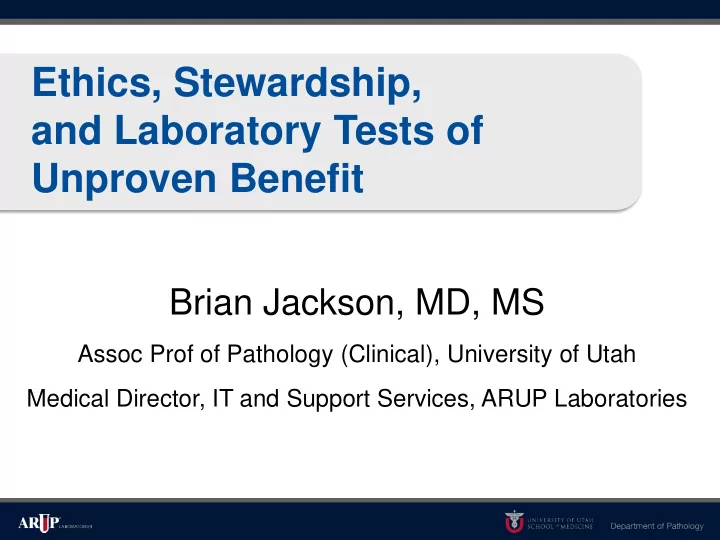

Ethics, Stewardship, and Laboratory Tests of Unproven Benefit Brian Jackson, MD, MS Assoc Prof of Pathology (Clinical), University of Utah Medical Director, IT and Support Services, ARUP Laboratories
Cas Case: e: Neo eopt pterin erin Tes est O Orders rders • Biomarker that correlates with T-cell activity • Of research interest, but not in mainstream clinical use for any particular disease • 770 orders to ARUP over a 12 month period – 83% from a single hospital – 64% of those were placed by a single physician (=53% of ARUP’s national volume)
When is it appropriate for clinicians to order tests of unproven/uncertain clinical utility?
Definitions • Analytic validity = accuracy in measuring a biomarker • Clinical validity = accuracy in diagnosing/assessing a disease • Clinical utility = medical benefit to the patient
Examples of unproven clinical utility • Tests that don’t distinguish clearly between disease and non-disease • Tests that tell us what we already know • Tests that tell us something we don’t need • Tests that have not been well studied in a particular clinical setting
What’s the best lens through which to view this issue?
Political $ Ethics FDA Science
Laboratory Testing Stakeholders Patients Physicians Hospitals Clinical Payers Regulators Laboratories
Laboratory Testing Stakeholders Patients Physicians Hospitals Ethics Clinical Payers Regulators Laboratories
Definitive Statements of Bioethics Declaration of Geneva Belmont Report (Individual Physician) (Researcher)
Declaration of Geneva • Physician perspective – Patients come first – Confidentiality – Good medical practice – Advance the profession – Advance the science
Belmont Report • (Human subjects) researcher perspective – Respect for persons – Beneficence – Justice
Applying these principles to laboratory testing…
Beneficience and Nonmaleficence • Benefit to patient = clinical utility • Potential harm to patient? – Should always be considered a possibility
Respect for Autonomy and Dignity of Patients • Informed consent – Fully informed decisionmaking requires information regarding risks and benefits
“Good Medical Practice” • Includes: – Guidelines – Evidence-based medicine – Generally accepted practices • Does not include personal preferences or ideas
Advancing the Science • Fill gaps in medical knowledge • Sound research methods – Controlled prospective trials where practical – Retrospective analyses that control for bias – Large enough sample sizes to draw significance
Justice • Healthcare resources are limited – Should be spent where they can provide the most benefit
Tests of unproven clinical utility raise multiple ethical challenges • Benefit is uncertain • Harm can’t be ruled out • Fully informed consent is problematic • Lack of external guidance • One-off testing doesn’t advance the science • Often expensive
What’s the most ethical approach to these tests?
Research paradigm for emerging tests • Formal study protocols – Could include registries/retrospective analyses – IRB oversight – Informed consent = acknowledge what we don’t know
Research paradigm for emerging tests • Compassionate Use – Clinical judgment has a legitimate role – Unique patients may benefit from unique approaches • But unique doctors might need to be reined in – Institutional oversight
Research paradigm for emerging tests • Funding – Public/private, grants/contracts – Self-pay – Not health insurance
Summary • Tests of uncertain clinical utility should follow a research paradigm, not a marketing paradigm – Protect patients – Advance the science – Protect resources
Recommend
More recommend